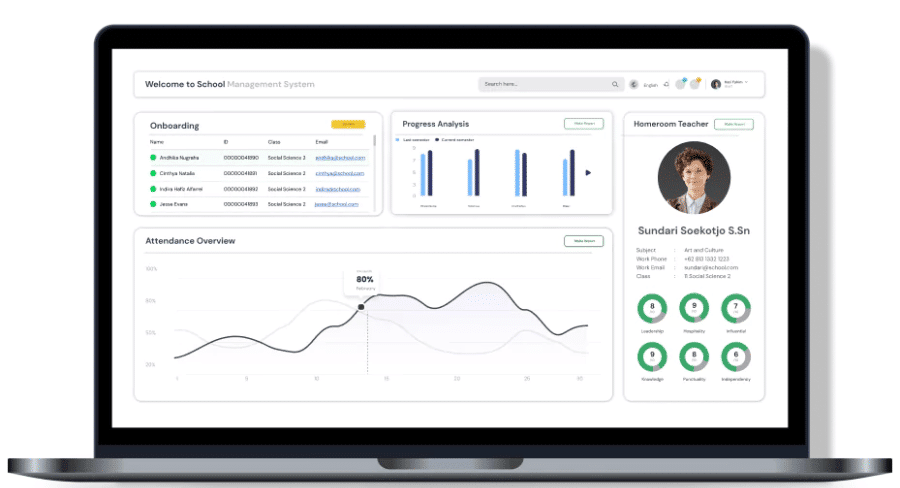Running a school in Singapore can often feel like juggling multiple responsibilities at once. With over 235.000 students enrolled in primary schools alone, managing schedules, meeting diverse student needs, and ensuring streamlined communication can indeed pose a significant challenge.
According to a recent survey by the Ministry of Education in Singapore, 78% of educators expressed the need for better tools to manage administrative tasks effectively. This is where a student management system emerges as a game-changer.
A school management system isn’t just a tool; it’s a powerful solution that integrates everything needed to teach and manage your school efficiently. In Singapore’s bustling education hub, where the demand for high-quality education remains constant, using an LMS isn’t merely a helpful idea—it’s becoming an indispensable necessity.
So, let’s delve deeper into understanding what these systems entail and why they’re crucial for schools and educational institutes here in Singapore.
Table of Content:
Table of Content
Key Takeaways
|

Why Singaporean Schools Need Learning Management Systems
Maintaining high standards of academic excellence poses a persistent challenge for educational institutions. The pressure to meet these benchmarks while catering to a diverse student population can be daunting.
Singapore’s commitment to education is undeniable, yet this commitment raises the stakes, creating a fear of falling behind in an environment where educational excellence is not just a goal but an expectation.
With a disparity in learning outcomes and access to resources among various demographic groups, the fear of leaving some students behind in the pursuit of excellence looms large. This fear isn’t unfounded; it’s a reality that requires strategic solutions.
Amidst these challenges, integrating a school management system emerges as an option and an essential lifeline for schools. These systems serve as more than a technological upgrade; they are a necessary tool for schools to bridge these gaps and mitigate the fear of educational inequity. The learning management system streamlines communication between stakeholders and creates a level playing field for all students by centralizing crucial aspects of education administration.
Moreover, the fear of adapting to evolving pedagogical approaches and meeting individual student needs within a diverse classroom can be overwhelming. However, an LMS, as developed by LMS developers, offers a ray of hope in this scenario, empowering educators to personalize lessons and effectively cater to individual learning styles. This capability to address diverse needs head-on is not just an advantage but a necessity in maintaining the inclusive nature of Singapore’s educational system.
Therefore, in a country renowned for its educational excellence, adopting an education management system is not merely a strategic move; it’s a proactive step toward addressing prevalent fears and challenges and ensuring that no student is left behind in pursuing academic success.
LMS for remote education has become indispensable in modern schooling. It provides an essential platform for teachers and students to interact effectively in a virtual classroom environment.
don’t miss out! Understand the differences between TMS vs LMS for better results!
Key Features of a Comprehensive Learning Management System (LMS)
In the digital era of education, the backbone of streamlined and effective teaching lies within the best learning management system. Understanding the key features of an LMS is vital for educational institutes seeking to optimize their teaching methodologies and administrative processes.
A robust LMS offers essential components that contribute to the efficiency and success of a modern LMS, revolutionizing the way educational content is managed and delivered. Here are some features that are usually offered by a comprehensive LMS such as HashMicro’s:
- Admission Management: Streamlining the admission process is crucial for handling a large number of prospective students efficiently and maintaining organized records.
- Teacher and Staff Profile Management: Managing profiles for faculty and staff helps in keeping track of their information, qualifications, and responsibilities within the institution.
- Parent Profile Management: Facilitating effective communication and engagement with parents is essential, and managing parent profiles can assist in maintaining this connection.
- Student Profile Management: Handling student records, academic progress, and personal information in a systematic manner is vital for a large institution.
- Program Management: Managing various academic programs and courses offered by the institution helps in structuring the curriculum effectively.
- Subject Management: Proper organization and management of subjects or courses are crucial for a structured academic environment.
- Attendance Management: Automating attendance tracking for a large number of students is essential for maintaining accurate records.
- Assignment and Exam Management: Streamlining the process of assigning tasks and managing exams digitally can greatly benefit a large institution in managing assessment processes efficiently.
- Fee Structure, Fee Register, and Student Invoice: Managing financial aspects, including fee structures and invoicing, is critical for a large-scale institution.
- Website or Portal: Having an accessible and user-friendly portal for various stakeholders like students, parents, and staff can enhance communication and information dissemination.
- Regular Timetable: Organizing and managing class schedules systematically ensures smooth functioning and avoids conflicts in a large institution.
- Admission Register Portal, Student Exam Portal, Student Assignment Portal, and Student Invoice Portal: Providing dedicated portals for specific tasks streamlines processes and enhances user experience. This is one of LMS learning system integration.
If you’re interested in the robust feature that HashMicro offers, check out the even more interesting price scheme that is best suited for your solution as school management software in Singapore. Click the image below to find out more!
Benefit of Using School Learning Management System for Singaporean
As an educator or school administrator, you’re constantly striving to provide the best learning experience for your students while efficiently managing administrative tasks.
The challenge lies in creating an environment that fosters not only academic growth but also engages students effectively, especially in today’s fast-paced and technology-driven world.
Here are some powerful ways a School Learning Management System Singapore can significantly transform your approach, addressing critical aspects of education:
Facilitation of remote and blended learning
You know how learning can sometimes happen outside the classroom? An LMS helps with that. It’s like having a special online place where you and your students can do lessons, talk about topics, and give assignments even if you’re not together.
This really helps, especially when something unexpected happens, and you need to teach from a distance or mix online and in-person classes. It makes learning possible from anywhere, just like bringing the classroom to your students’ homes.
Not only that, an LMS can integrate with the latest educational technologies, such as AI, augmented reality or virtual reality, to create a more immersive learning experience.
Enhanced organization and efficiency
Running a school can be busy, right? But with a learning management system, it’s like having a smart helper that organizes everything for you. All your teaching stuff—like lesson plans, grades, and messages—are kept neat and tidy in one place. It’s much easier for you to find what you need, and it saves time too. Less time spent organizing means more time for teaching and helping your students.
Personalized learning experiences
Think about how different your students are. Some might need more help with certain things while others grasp concepts quickly. An LMS helps you give each student what they need. You can provide special resources or tasks that match how each student learns best. This makes learning more enjoyable for them and helps everyone understand things better.
Collaboration and engagement
You know how great it is when everyone works together? An LMS makes it easy for students and teachers to talk, work on projects, and share thoughts. It’s like creating a big team where everyone helps each other learn. This makes learning more interesting for students because they can talk and work with their classmates and teachers, even if they’re not in the same place.
Data-driven decision-making
Ever wonder how well your students are doing in your class? An LMS gives you the answers. It shows you information about how your students learn and where they’re doing well or struggling. This helps you understand what’s working in your teaching and what needs improving. Plus, it helps your school figure out how to make things better for everyone.
Data security in educational LMS is paramount, ensuring that student information and academic records are protected with advanced encryption and privacy protocols. Therefore, it is important to look for LMS vendor that have ISO certification like HashMicro to ensure data security and privacy.
Who is Benefitted from Using School Learning Management Systems
Here are some key stakeholders who experience substantial advantages through the utilization of Learning Management Systems for school, reshaping the educational landscape for students, educators, and administrators alike:
Students
School Learning Management Systems significantly benefit students by providing them with a more accessible and engaging learning experience. Through an LMS, students can access course materials, assignments, and resources conveniently from anywhere, fostering a sense of flexibility in their learning journey.
Moreover, personalized learning features within the LMS cater to individual learning styles, enabling students to progress at their own pace and grasp concepts more effectively. Collaboration tools in the LMS encourage interaction among peers, facilitating group discussions, project collaborations, and sharing of ideas.
These platforms also offer transparency regarding their progress, allowing students to track their performance and receive timely feedback, contributing to their academic growth and boosting their overall learning experience.
Educators
For educators, School Learning Management Systems revolutionize the teaching experience. LMS platforms streamline administrative tasks, providing a centralized location to manage course materials, create assignments, grade assessments, and communicate with students.
The ability to customize content and learning paths empowers educators to tailor teaching methods to suit individual student needs, thereby enhancing engagement and understanding. Additionally, LMS analytics offer insights into student performance, helping educators identify areas for improvement and adapt teaching strategies accordingly.
Collaboration tools in the LMS facilitate seamless communication among educators, enabling ease of tracking learning progress, access to educational resources, and increased collaboration within the classroom.
Moreover, Customizable learning experiences in LMS enable educators to tailor content and teaching methods to meet diverse student needs, enhancing the effectiveness of online education.
Administrators
School administrators benefit from LMS platforms by gaining a comprehensive overview of the institution’s educational processes. These systems offer administrative tools to manage courses, enrollments, and resources efficiently.
Advanced analytics and reporting in LMS provide educators with detailed insights into student engagement and progress, enabling targeted support and personalized learning strategies. The centralized nature of LMS platforms streamlines communication between faculty, students, and parents, ensuring a more connected educational community.
Furthermore, the ability to track and monitor various aspects of the institution’s operations through an LMS contributes to better organizational efficiency and informed decision-making, ultimately improving the quality of education offered.
Conclusion
In conclusion, the adoption of School Learning Management Systems brings a multitude of benefits, serving as a catalyst for transformative education. Students find themselves in a more accessible and engaging learning environment, educators are equipped with innovative tools to tailor their teaching methods, and administrators witness streamlined operations fostering better decision-making.
One company that understand the evolving needs of modern education is HashMicro. With cutting-edge School Learning Management Systems that are designed to empower educators, administrators, and students with an array of features aimed at optimizing learning experiences. Experience the difference today by scheduling a free demo by clicking here! Discover how HashMicro LMS solutions can elevate your institution to new heights.
FAQ About Learning Management System
-
What is a Learning Management System (LMS), and how does it benefit schools in Singapore?
A Learning Management System (LMS) is a software application that helps educational institutes in Singapore manage their courses, educational materials, and student data online. It benefits schools by centralizing administrative tasks, facilitating remote learning, and enhancing personalized education for diverse student populations.
-
How does an LMS aid in addressing the educational challenges faced by schools in Singapore?
Learning Management Systems assist schools in Singapore by streamlining administrative tasks, offering personalized learning experiences, and promoting engagement among students and educators. These systems also provide data-driven insights, allowing educators to adapt teaching strategies to meet the diverse needs of students.
-
Can an LMS adapt to the specific needs and curriculum requirements of schools in Singapore?
Yes, modern LMS platforms are designed to be customizable and adaptable to the unique needs of schools in Singapore. They can align with various curriculum frameworks and accommodate diverse teaching methodologies prevalent in Singaporean education.
-
How can an LMS support the integration of technology into education within Singapore?
LMS platforms enable the seamless integration of technology into education by providing a digital environment for learning, supporting remote and blended learning approaches, and facilitating communication between students, teachers, and parents in Singapore’s technologically advancing educational landscape.
-
What measures ensure the security and privacy of student data within an LMS used by schools in Singapore?
Learning Management Systems prioritize data security and comply with Singapore’s strict data protection regulations. They employ robust security measures, encrypted connections, and role-based access control to safeguard sensitive student information and maintain confidentiality.






































